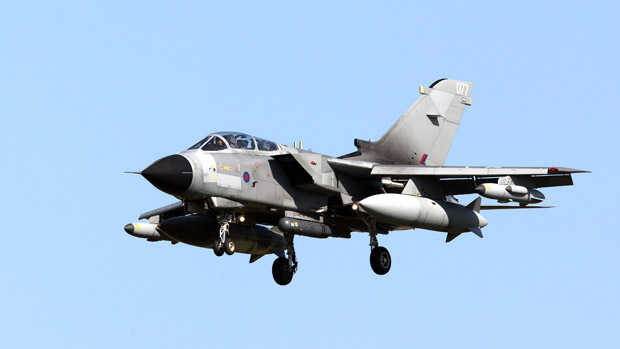MPs to vote on Islamic State air strikes: what are they debating?
RAF Tornado jets are poised to attack militants in Iraq once MPs have backed British military intervention

A free daily email with the biggest news stories of the day – and the best features from TheWeek.com
You are now subscribed
Your newsletter sign-up was successful
MPs are set to vote overwhelmingly in favour of British military action against Islamic State in Iraq later today. David Cameron has called an emergency House of Commons debate to urge parliament to back his proposal to join the US military campaign against the militants. With the debate underway and support expected from all three main parties, UK air strikes look set to begin immediately.
What is the vote likely to approve?
The vote will determine whether the UK should support the Iraqi government in defending itself against Islamic State (IS). This includes the use of UK air strikes against the militants in Iraq. The motion put forward by Cameron acknowledges that there is a "clear legal basis" for such action because it comes at the request of Iraq's government.
The Week
Escape your echo chamber. Get the facts behind the news, plus analysis from multiple perspectives.

Sign up for The Week's Free Newsletters
From our morning news briefing to a weekly Good News Newsletter, get the best of The Week delivered directly to your inbox.
From our morning news briefing to a weekly Good News Newsletter, get the best of The Week delivered directly to your inbox.
What will it not approve?
The US began a series of air strikes in Iraq last month and on Monday it began attacks on targets in Syria. However, Cameron is not proposing air strikes in Syria and has said that any future proposal to do so would be subject to a separate vote in parliament. The decision to stay out of Syria follows "delicate talks" to ensure co-operation by Labour, says The Times, as well as parliament's rejection of air strikes against the Syrian regime last year. Today's motion also states that UK troops will not be deployed in ground combat operations. However, the Financial Times suggests the motion leaves open the possibility of UK troops being deployed in special forces and advisory roles.
Who will support the vote?
The plan was unanimously agreed by Cabinet following a briefing by General Sir Nicholas Houghton, chief of the defence staff. The Liberal Democrats and Labour have also said they will back the action, meaning that Cameron could be confident of the result of the vote even before he stood up to make his opening address at 10.30am today. According to a YouGov poll published in The Sun, 57 per cent of Britons said they were behind air strikes in Iraq. Defence Secretary Michael Fallon told the House magazine that Britain must be prepared to continue the campaign until 2017.
A free daily email with the biggest news stories of the day – and the best features from TheWeek.com
Who will oppose it?
Despite an overall agreement between the three main parties, there are still individual MPs against military intervention. Madeleine Moon, a Labour MP on the defence select committee, believes there are far too many unanswered questions. Labour's Diane Abbott, Jeremy Corbyn and John McDonnell have signed a letter to The Guardian which says bombing Iraq will "only exacerbate the situation". They have urged government to rule out any further military action in Iraq or Syria. Conservative MP Philip Davies has said he will abstain. "I am not a great fan of us involving ourselves in these things. Often you don't know who you are going to be benefiting by getting involved," he said.
How soon might strikes start?
The Commons debate is due to last for seven hours. Six RAF Tornados in Cyprus have been ready to carry out air strikes for weeks, says Jonathan Beale, BBC defence correspondent. "Their laser-guided bombs and missiles will be loaded and armed soon after parliament gives the green light." The Financial Times says that with a cruise speed of "just under the speed of sound" it will take the Tornados less than 60 minutes to reach northern Iraq
What will the military intervention involve?
The Tornados have already flown on reconnaissance missions over Iraq to identify potential targets, such as control and command centres, says Beale, although some of these targets might have since been hit by US war planes. The Tornados will also be looking for "targets of opportunity – such as IS fighters and vehicles on the move", he says. Officials have said the initial bombing campaign could be sporadic. The FT says if a decision is taken for a "more muscular response" in the future, Britain may also dispatch its "more sophisticated" Typhoon aircraft, its Reaper drones and its new fleet of Astute class nuclear-powered submarines to launch cruise missiles on IS targets.
-
 Nepal’s fake mountain rescue fraud
Nepal’s fake mountain rescue fraudUnder The Radar Arrests made in alleged $20 million insurance racket
-
 History-making moments of Super Bowl halftime shows past
History-making moments of Super Bowl halftime shows pastin depth From Prince to Gloria Estefan, the shows have been filled with memorable events
-
 The Washington Post is reshaping its newsroom by laying off hundreds
The Washington Post is reshaping its newsroom by laying off hundredsIn the Spotlight More than 300 journalists were reportedly let go
-
 The Mandelson files: Labour Svengali’s parting gift to Starmer
The Mandelson files: Labour Svengali’s parting gift to StarmerThe Explainer Texts and emails about Mandelson’s appointment as US ambassador could fuel biggest political scandal ‘for a generation’
-
 The high street: Britain’s next political battleground?
The high street: Britain’s next political battleground?In the Spotlight Mass closure of shops and influx of organised crime are fuelling voter anger, and offer an opening for Reform UK
-
 Is a Reform-Tory pact becoming more likely?
Is a Reform-Tory pact becoming more likely?Today’s Big Question Nigel Farage’s party is ahead in the polls but still falls well short of a Commons majority, while Conservatives are still losing MPs to Reform
-
 Taking the low road: why the SNP is still standing strong
Taking the low road: why the SNP is still standing strongTalking Point Party is on track for a fifth consecutive victory in May’s Holyrood election, despite controversies and plummeting support
-
 What difference will the 'historic' UK-Germany treaty make?
What difference will the 'historic' UK-Germany treaty make?Today's Big Question Europe's two biggest economies sign first treaty since WWII, underscoring 'triangle alliance' with France amid growing Russian threat and US distance
-
 Are free votes the best way to change British society?
Are free votes the best way to change British society?Today's Big Question On 'conscience issues' like abortion and assisted dying, MPs are being left to make the most consequential social decisions without guidance
-
 Is the G7 still relevant?
Is the G7 still relevant?Talking Point Donald Trump's early departure cast a shadow over this week's meeting of the world's major democracies
-
 Angela Rayner: Labour's next leader?
Angela Rayner: Labour's next leader?Today's Big Question A leaked memo has sparked speculation that the deputy PM is positioning herself as the left-of-centre alternative to Keir Starmer